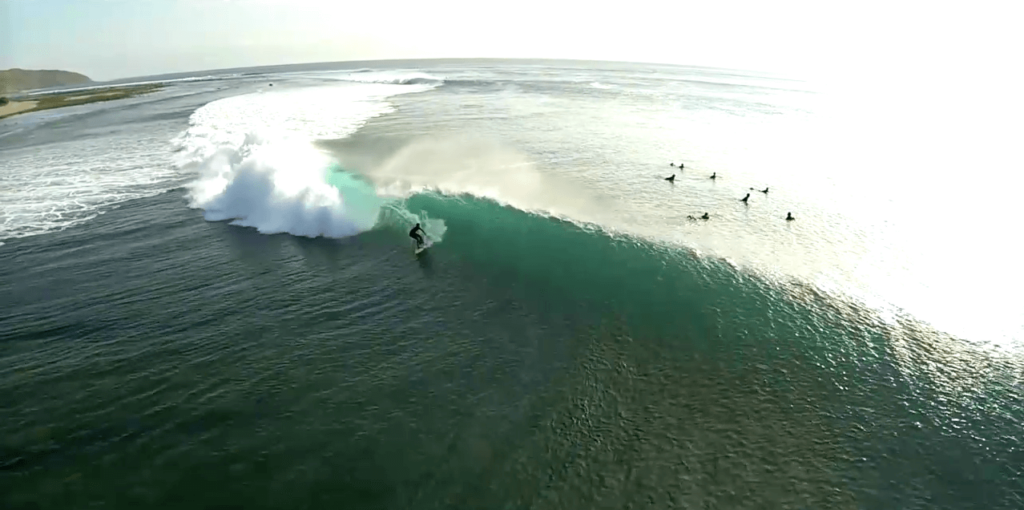Surfing enthusiasts and nature lovers alike should add Desert Point Lombok to their bucket list. Located on the southern tip of Lombok Island in Indonesia, Desert Point is a world-renowned surfing destination that offers exceptional surfing conditions and stunning natural beauty. With increasing investment potential and upcoming developments in the area, now is the time to plan your visit to this gem of Southeast Asia.

The Ultimate Surfing Destination - Desert Point Lombok
Desert Point Lombok is one of the world's best surf spots, known for its long barrels and perfect waves. This surfing destination is a challenge even for experienced surfers, but the rewards are worth it. The reef break creates long barrels that surfers can ride for up to 300 meters with a height of 3 meters. The surrounding cliffs and turquoise waters create a picturesque backdrop, making it an unforgettable experience.

Natural Beauty of Desert Point Lombok
Desert Point Lombok is not only a world-renowned surfing destination but also a place of breathtaking natural beauty. The surrounding landscape is stunning, with lush greenery, cliffs, and pristine beaches. Visitors can also enjoy boat trips and relaxing on the white sandy beach.
https://www.youtube.com/watch?v=i3MljF-qMKk
Desert Point, Lombok
Increased Accessibility and Investment Potential
While Desert Point was once a remote and isolated location, the completion of the Lombok International Airport has made it more accessible to tourists. This increased accessibility has led to an increase in the value of the land around and near Desert Point, making it an attractive prospect for investors. Investment opportunities around Desert Point include developing resorts, hotels, villas, and other tourism-related businesses.

The Indonesian government has designated Lombok Island as a special economic zone – The New Bali, providing tax incentives and other benefits for investors. This designation has made it easier for investors to obtain permits and licenses for their projects, reducing bureaucratic hurdles. The government has also announced plans to develop the Mandalika Resort area, just a few kilometers from Desert Point. The Mandalika Resort is set to become a world-class integrated resort with luxury hotels, golf courses, and a marina, making it a desirable destination for tourists. This development will further increase the value of the land around Desert Point and attract more tourists to the area.

Other Must-Visit Spots in Lombok
Sekotong and the Secret Gili are two other must-visit spots in Lombok. Sekotong, located on the west coast of Lombok, offers stunning beaches, clear waters, and breathtaking views of the surrounding islands. It's also an excellent spot for snorkeling and diving. The Secret Gili, located on the northwest coast of Lombok, is a hidden gem that offers pristine beaches, perfect for swimming and sunbathing.

Mekaki Bay is another upcoming destination in Lombok. The area is home to the Apurva Kempinski Resort, a luxury hotel that offers unparalleled views of the Lombok Strait and the Bali Sea. Mekaki Bay is also a popular spot for water activities such as diving, snorkeling, and fishing.

Pengantap Land, located near Desert Point, is a premium land for investment that offers stunning views of the sea and the surrounding hills. With the increasing demand for quality accommodation in the area, Pengantap Land is a prime location for developing luxury villas, resorts, and other tourism-related businesses.

Selong Belanak, situated on the southern coastline of Lombok, is a must-visit destination for anyone who loves beaches. With its soft white sand, crystal-clear waters, and stunning scenery, this beach is the perfect spot for surfing, swimming, and sunbathing. Additionally, for those who are new to surfing, Selong Belanak's gentle waves make it an ideal location to learn and practice. Whether you're a beginner or an experienced.
In conclusion, Desert Point Lombok and its surrounding areas offer a wide range of opportunities for surfing, water activities, and tourism-related investments. While Desert Point is world-renowned for its exceptional surfing conditions, it also offers stunning natural beauty, making it a must-visit destination for both surfers and non-surfers. Other destinations in Lombok, such as Sekotong, Secret Gili, Mekaki Bay, Pengantap Land, and Selong Belanak, offer equally beautiful beaches and opportunities for water activities, making Lombok Island a year-round destination for visitors.

The increased accessibility of the area due to the Lombok International Airport and the Indonesian government's plans to develop the Mandalika Resort area and the island into a hub for halal tourism make it an attractive prospect for investors. The potential for investment and growth in the tourism industry in Lombok is immense, and now is the time to plan your visit or invest in this gem of Southeast Asia.
If you're a surfing enthusiast or nature lover looking for your next adventure, make sure to add Desert Point Lombok to your bucket list. With its perfect waves, breathtaking natural beauty, and investment potential, this destination is one that you won't want to miss. The best time to visit Desert Point for surfing is during the dry season from May to October when the waves are at their best. However, Lombok Island is a year-round destination, offering visitors an opportunity to experience the unique culture and natural beauty of the island regardless of the season.





%402x.svg)




%402x%20(dark).svg)
%402x%20(dark).svg)